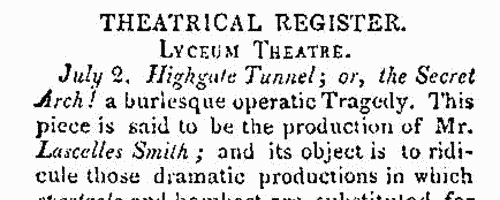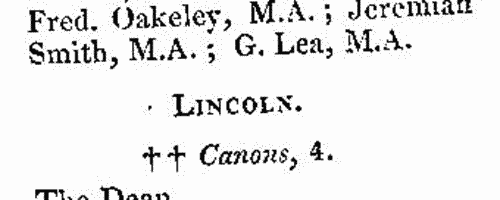Add this eBook to your basket to receive access to all 54 records. Our indexes include entries for the spelling apthorpe. In the period you have requested, we have the following 54 records (displaying 21 to 30): These sample scans are from the original record. You will get scans of the full pages or articles where the surname you searched for has been found. Your web browser may prevent the sample windows from opening; in this case please change your browser settings to allow pop-up windows from this site.  Masters of apprentices and clerks
(1802) Masters of apprentices and clerks
(1802)
Apprenticeship indentures and clerks' articles were subject to a 6d or 12d per pound stamp duty: the registers of the payments usually give the master's trade, address, and occupation, and the apprentice's name, as well as details of the date and length of the apprenticeship. 3 June to 31 December 1802. IR 1/39 | Sample scan, click to enlarge

| Deaths, Marriages, News and Promotions
(1810)
Death notices and obituaries, marriage and birth notices, civil and military promotions, clerical preferments and domestic occurrences, as reported in the Gentleman's Magazine. Mostly from England and Wales, but items from Ireland, Scotland and abroad.
| Sample scan, click to enlarge

| Deaths, Marriages, News and Promotions
(1812)
Death notices and obituaries, marriage and birth notices, civil and military promotions, clerical preferments and domestic occurrences, as reported in the Gentleman's Magazine. Mostly from England and Wales, but items from Ireland, Scotland and abroad.
| Sample scan, click to enlarge

| Cambridgeshire Voters: Cambridge
(1832)
The poll on the election of three knights of the shire to serve in Parliament for the county of Cambridge, was taken at Cambridge, Royston, Newmarket, Ely, Wisbech and Whittlesea 18 and 19 December 1832. The candidates were Henry John Adeane esquire, Richard Greaves Townley esquire, Charles Philip Yorke esquire and John Walbanke Childers esquire. This poll book sets out the names of the voters in alphabetical order hundred by hundred and parish by parish. The voters' full names are stated, surname first. The right hand column records their votes. The new qualification for suffrage in the counties, after the passage of the 1832 Great Reform Bill, was the possession of a freehold estate worth 40s a year or more, a copyhold or long leasehold of £10 a year or more, or a tenancy or short leasehold of £50 a year or more.
| Sample scan, click to enlarge

| Deaths, Marriages, News and Promotions
(1834)
Death notices and obituaries, marriage and birth notices, civil and military promotions, clerical preferments and domestic occurrences, as reported in the Gentleman's Magazine. Mostly from England and Wales, but items from Ireland, Scotland and abroad.
| Sample scan, click to enlarge

| Insolvents
(1836)
Insolvency notices for England and Wales: insolvency often caused people to restart their lives elsewhere, so these are an important source for lost links | Sample scan, click to enlarge

| Deaths, Marriages, News and Promotions
(1837)
Death notices and obituaries, marriage and birth notices, civil and military promotions, clerical preferments and domestic occurrences, as reported in the Gentleman's Magazine. Mostly from England and Wales, but items from Ireland, Scotland and abroad.
| Sample scan, click to enlarge

| Insolvents
(1837)
Insolvency notices for England and Wales: insolvency often caused people to restart their lives elsewhere, so these are an important source for lost links | Sample scan, click to enlarge

| Deaths, Marriages, News and Promotions
(1839)
Death notices and obituaries, marriage and birth notices, civil and military promotions, clerical preferments and domestic occurrences, as reported in the Gentleman's Magazine. Mostly from England and Wales, but items from Ireland, Scotland and abroad.
| Sample scan, click to enlarge

| Churchmen and church officers in England and Wales
(1841)
The Royal Kalendar has an extensive ecclesiastical section, giving the names of officials at the College of Doctors of (church) Law, the Ecclesiastical Courts, and the ecclesiastical law proctors; deans, chancellors, archdeacons, canons and prebendaries for all the dioceses of England and Wales; the officers and fellows (being all the parish priests within and without the walls of London) of Sion College; and the incumbents of the parishes within ten miles of London (annotated to show whether rectors, vicars or curates, and with the net annual revenue of each cure); the Ecclesiastical Commissioners for England; the Committee of Council on Education; and then the officers of the various religious societies (Queen Anne's Bounty Office, and First-Fruits and Tenths Offices; Commissioners for Building Additional Churches; Society for Promoting the Building of Churches and Chapels; Anniversary Festival of the Sons of the Clergy; Society for Promoting Christian Knowledge; Society for the Propagation of the Gospel in Foreign Parts; Dissenters' Library; Society for Maintaining and Educating Poor Orphans of Clergymen of the Established Church; Society for Promoting Religious Knowledge; Patrons of the Anniversary of the Charity Schools; Naval and Military Bible Society; Society for the Support and Encouragement of Sunday Schools throughout the British Dominions; Society for Extending the Christian Faith in the British West India Islands; London Missionary Society; Religious Tract Society; Society for the Suppression of Vice; British and Foreign Bible Society; Church Missionary Society; Prayer Book and Homily Society; Dr Bray's Institution; London Society for Promoting Christianity among the Jews; National Society for the Education of the Poor in the Principles of the Established Church; Church Pastoral Aid Society; European Missionary Society; British Society for Promoting the Religious Principles of the Reformation; and the Protestant Association). | Sample scan, click to enlarge

|
Research your ancestry, family history, genealogy and one-name study by direct access to original records and archives indexed by surname.
|












